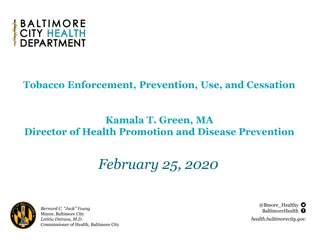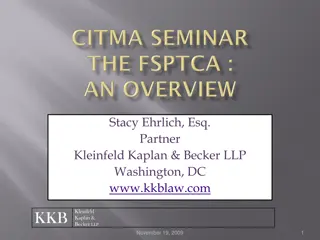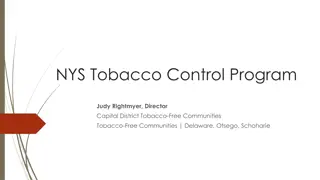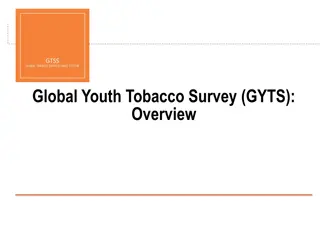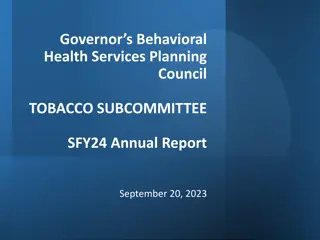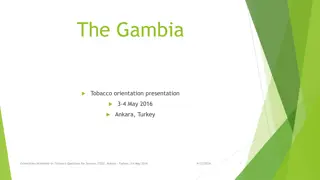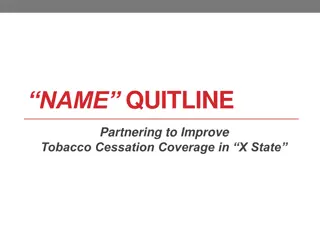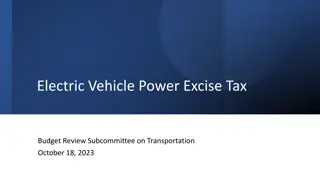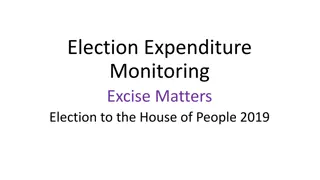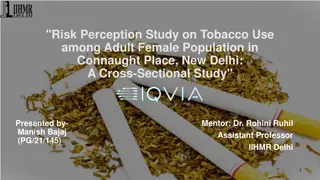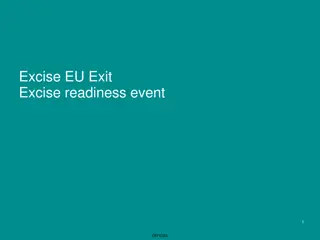Impact of Excise Tax Increase on Tobacco Retail Prices in New Zealand
Research conducted by the Cancer Society's Social & Behavioural Research Unit in New Zealand focused on the effectiveness of tax increases on tobacco consumption. The study analyzed the retail pricing strategies of British American Tobacco (BAT) and the impact of annual excise tax increases on different tobacco brand segments from 2010 to 2014. Data from a sample of 711 retailers across various types of stores was collected, showing differential pricing trends for mainstream, premium, budget, and RYO brands. Price changes following a 10% excise tax increase in January 2014 varied among brand segments. This research sheds light on the importance of tax policies in influencing tobacco prices and consumption patterns.
Download Presentation

Please find below an Image/Link to download the presentation.
The content on the website is provided AS IS for your information and personal use only. It may not be sold, licensed, or shared on other websites without obtaining consent from the author.If you encounter any issues during the download, it is possible that the publisher has removed the file from their server.
You are allowed to download the files provided on this website for personal or commercial use, subject to the condition that they are used lawfully. All files are the property of their respective owners.
The content on the website is provided AS IS for your information and personal use only. It may not be sold, licensed, or shared on other websites without obtaining consent from the author.
E N D
Presentation Transcript
The impact of an increase in excise tax on the retail price of tobacco in New Zealand Louise Marsh, Claire Cameron, Robin Quigg, Janet Hoek, Crile Doscher, Rob McGee and Trudy Sullivan Cancer Society Social & Behavioural Research Unit (SBRU) Te Hunga Rangahau rai Mate Pukupuku 25 years of social & behavioural research in cancer control
Effectiveness of tax increases Single most effective measure to reduce health burdens
Effectiveness of tax increases Demand elasticity Price increase of 10% would reduce consumption by 4% Young people are more price sensitive Industry tactics Over and under shifting taxes
Aims of the research 1. Whether, on average, tobacco retailers charge British American Tobacco s (BAT) Recommended Retail Price (RRP) for different brand segments 2. Whether BAT applied the annual 10% tobacco excise tax increase differentially to budget, mainstream, premium and RYO brands over the period 2010 to 2014.
What did we do? Data was collected from a sample of retailers from 10 DHB s Focused on 4 types of retailers: Convenience stores Supermarkets Service stations Liquor stores Proportional random sample Final sample 711 retailers Price data was collected: Stage 1: Nov/Dec 2013 Stage 2: Jan/Feb 2014 http://static2.stuff.co.nz/1369180712/606/8703606.jpg
BAT brands selected Mainstream 471 retailers Premium 448 retailers RYO Budget 461 retailers 464 retailers
Change in retail price after 10% tobacco excise tax increase Jan 1st 2014 Mainstream Premium RYO Budget +3% +11% +8% +11%
Change in RRP from 2010 to 2014 2011 2012 2013 2014 Budget (GST excl) RRP $10.43 $12.00 $13.57 $13.91 Expected RRP $12.43 $13.68 $14.68 $15.79 Difference $(1.92) $(1.68) $(1.11) $(1.87) Premium (GST excl) RRP $15.57 $17.39 $19.48 $21.65 Expected RRP $15.13 $16.77 $18.02 $19.43 Difference $0.44 $0.62 $1.46 $2.22
Implications: Quitting Calls to Quitline increased after 2010 excise tax increase Callers more likely to cite cost as reason for quitting Impact of excise tax increases on quitting may not be maintained Acclimation: Anticipate tax increases Switch to cheaper alternative
Implications: Regressiveness of tax Excise tax may inequitably burden smokers from low SES groups health inequalities M ori and Pacific Island smokers more responsive to tax increases Hypothecation of taxes Stimulate greater cessation
What next? Excise tax modification: Larger increases of at least 20% A large, one-off, surprise tax increase of 40% Additional policy measures Flat rate minimum price laws Mark up minimum price laws Part of a comprehensive tobacco control programme
Conclusion Current tax structure allows tobacco companies to shift tax increases between price partitions Policy makers need to consider modifications Policies to limit the current responses Excise tax is an important part of achieving the endgame
Thank you The researchers wish to thank the Smokefree Enforcement Officers and Cancer Society staff who collected data for this study. Contact details: Louise Marsh Cancer Society Social and Behavioural Research Unit University of Otago Louise.marsh@otago.ac.nz
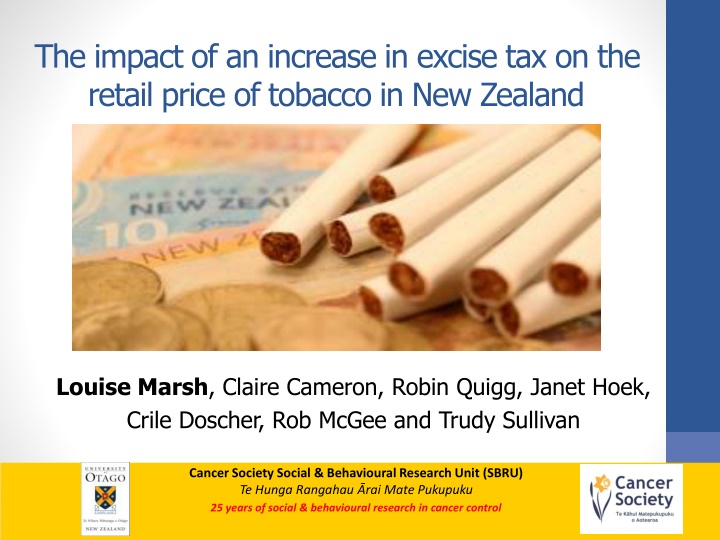

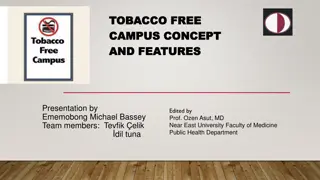
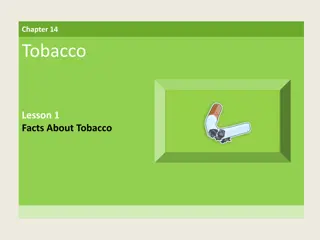
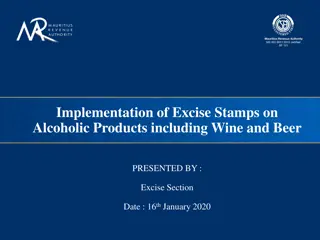
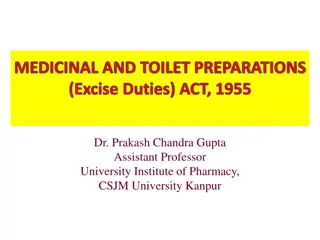
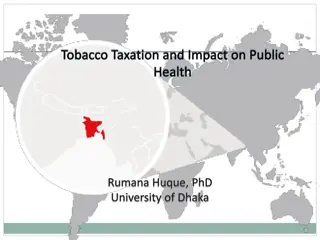
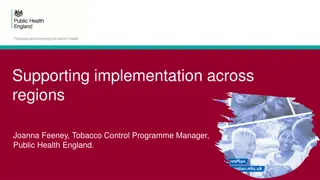
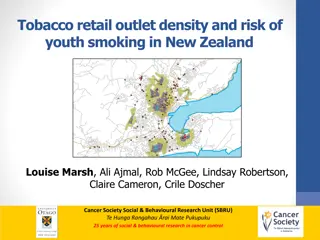
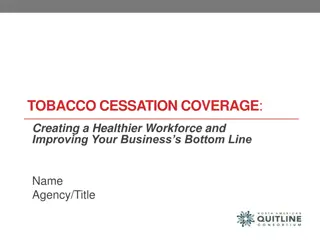
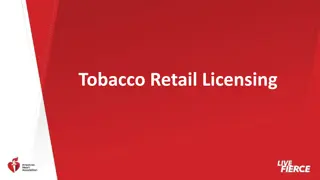
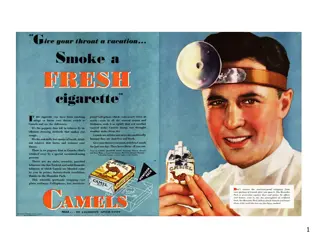
![Protecting Youth Through Tobacco Retail Licensing in [Your County]](/thumb/175307/protecting-youth-through-tobacco-retail-licensing-in-your-county.jpg)
